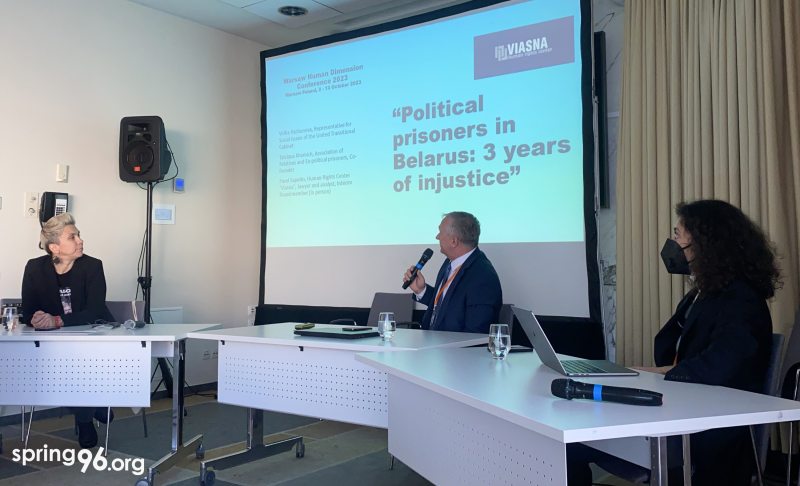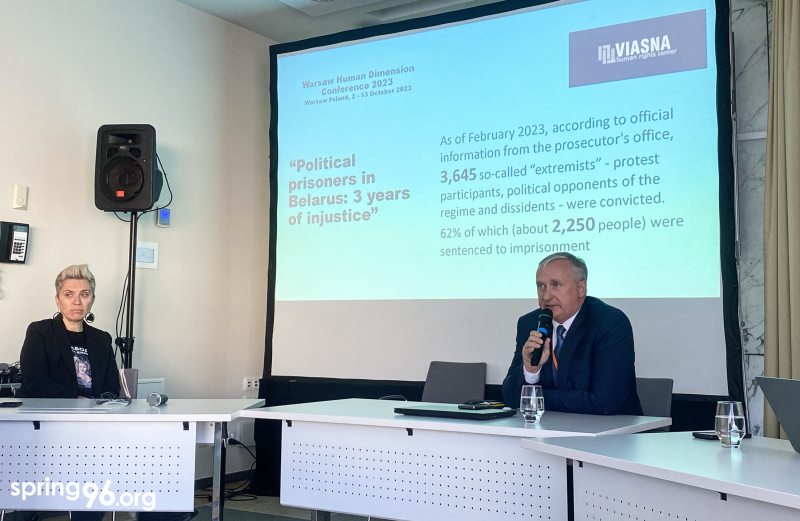"Why can't it be done in Belarus when it's possible in other places?" OSCE conference addressed the issue of freeing political prisoners in Belarus
The largest yearly gathering on human rights and democracy in Europe, the OSCE Human Dimension Conference, is happening in Warsaw from October 2 to 13. On October 10, the Viasna Human Rights Center arranged a side event to discuss the current situation of political prisoners in Belarus and their potential release. The meeting had United Transitional Cabinet's social policy representative, Volha Harbunova, and human rights activists Tatsiana Khomich (co-founder of the Association of Relatives of Current and Former Political Prisoners) and Pavel Sapelka from Viasna discussing the situation of political prisoners and repression in Belarus deteriorating over the last three years. They also talked about ways of speeding up the release of the prisoners and extending support to them.

- Volha Harbunova, Pavel Sapelka and Tatsiana Khomich at a side-event on April 10, 2023. Photo: spring96.org
"The regime is doing everything to ensure that protesters are not recognized as political prisoners"
At the side event, Pavel Sapelka, a human rights defender with Viasna, spoke about the current human rights situation in Belarus and outlined the trends of political persecution by Lukashenka's regime:
“There is no relaxation or signals that the level of repression is decreasing. The Belarusian authorities regularly say that they are fighting extremism, but the figures say the opposite: 1,750 people have been sentenced for taking part in peaceful protests, 1,650 for 'insulting' various officials, Lukashenka, and judges. This is the price Belarusians are paying for their desire for freedom and their attempt to exercise their civil rights and freedoms."
Pavel noted that, besides the 1,489 people recognized as political prisoners by the human rights community in Belarus as of October 11, 2021, an additional 1,200 individuals had been imprisoned and subsequently released for various reasons in connection to the 2020 events. Volha Harbunova, the social policy representative for the United Transitional Cabinet, stated that the data could be incomplete due to intimidation and fear from Belarus citizens to report persecution to human rights activists and difficulties from the authorities.
“The regime is doing everything to ensure that protesters are not recognized as political prisoners, treating them like regular lawbreakers, stripping them of any solidarity and support from their loved ones, and even following their release, they would not receive any reparation, rehabilitation, or recognition that they did not engage in wrongdoing.”
"It's hundreds of people and everyone's circumstances are serious"
Volha Harbunova, who currently serves as the social policy representative for the United Transitional Cabinet, experienced detention centers in Belarus, was in custody as a political prisoner and crossed the Belarusian-Lithuanian border illegally during her evacuation from the country. In her speech at the side event, she shared her journey and noted,
"As a former political prisoner, I am driven by a sense of guilt. I wouldn't be doing everything I am doing now if it weren't for the people I know personally staying behind bars."
She warned that from a humanitarian point of view, it is too risky for many political prisoners to remain in detention centers. These prisoners are in danger of permanently harming their health and even losing their lives. They are seniors, people with disabilities and serious illnesses, parents with many children, members of the LGBTQ+ community, war veterans, and more.
"Here are some examples of the medical needs of our political prisoners: some require urgent operations, including organ transplants, others experience necrosis of joints, severe stages of cancer, heart attacks, strokes, asthma, vision and hearing loss, diabetes, brain tumors, tuberculosis, and perforated ulcers... There are hundreds of people, and everyone's situation is serious."
Volha Harbunova recalled the stories of Pinsk blogger Mikalai Klimovich and artist Ales Pushkin, who passed away while in custody.
The representative of the Cabinet came wearing a T-shirt with the inscription "Freedom to Halina Dzerbysh" and a portrait of the political prisoner in the "Autukhovich case", sentenced to 20 years in prison. She told Halina's story, highlighting her health complications:
“You could say that the regime would not last that long – 20 years – but it’s important to note that Halina is 61 years old and suffers from cancer and serious heart issues. She has been held at the pre-trial detention center for approximately two years, of which one was spent in solitary confinement. Shockingly, she was never checked by a medic during that time. It is essentially a life sentence to be given 20 years for a crime she did not commit."
Tatsiana Khomich drew attention to the fact that some political prisoners, including Maria Kalesnikava, are held in incommunicado mode, which constitutes torture.
"The entire prison system is constructed to cause physical harm and crush morale"
The Cabinet representative highlighted the extended probation periods as a type of complete surveillance; the political prisoners on the humanitarian list are subjected to hard labor in unhealthy work environments, and they also face mistreatment in prisons. Palina Sharenda-Panasiuk’s case is an example of such harassment.
“The entire prison system is constructed to cause physical harm and crush morale. For instance, when we consider that as of April 29th of this year, inmates in pretrial detention centers across the country are prohibited from using foreign-made medical drugs, what else is this but torture? If I were to be incarcerated in a pretrial detention center for six months without my hormone therapy medication, it would be extremely difficult for me. If you have a medical condition, choosing the right medication and dosage can take years. The Belarusian hormones don’t work for me, even though they claim to provide them for political prisoners. However, how many political prisoners rely on these foreign drugs? These actions are intentional; one should not assume they are accidental or poorly thought out,” believes Volha Harbunova.
"Even with Putin, negotiations are now underway for the release of prisoners of war"
The Cabinet spokeswoman said they were gathering experience and consulting countries where there had been a similar problem in releasing political prisoners:
“These include Nicaragua, Cuba, Afghanistan, Iran, and Ukraine. The release of political prisoners in Belarus has occurred, demonstrating the possibility. We have gathered data on political prisoners released in Belarus since 2020, with a total of at least 34 cases. Other crises on this planet have also seen similar instances of release – why can’t it be done in Belarus when it’s possible in other places? I understand that things are complicated since Lukashenka’s regime got involved in the war Russia started in Ukraine. We’re in a different situation, but we can’t tell our political prisoners that we did everything we could and gave up. We need the support of the international community, which has experience mediating conflicts like this.
Political prisoners in Belarus are no different from political prisoners around the world. Many say that the fate of Belarusian political prisoners will be determined by the outcome of the battlefields in Ukraine. If the war is won, fundamental changes will follow in Belarus and our political prisoners will be released. Despite the bombing of cities and loss of civilian lives, negotiations for releasing war prisoners with Putin offer a glimmer of hope. There are forces and processes established to assist with evacuations and rescues. Negotiations for rescuing people are not a political maneuver but rather a vital part of life-saving efforts.”
"We are responsible for the conditions of detention of political prisoners and the situation with financial situation of their families"
Volha Harbunova emphasized the significance of backing civil society, as just a few groups and efforts are aiding individuals convicted on political grounds and ex-political prisoners.
"The crisis in our nation persists and deteriorates after three years. We haven't vanished. The people behind bars are genuine and existent.”
Pavel Sapelka recalled the persecution of human rights defenders in Belarus, in particular the politically imprisoned members and volunteers of Viasna Ales Bialiatski, Valiantsin Stefanovich, Uladzimir Labkovich, Marfa Rabkova, Andrei Chapiuk, as well as human rights activist Nasta Loika.
“We understand that even if we don’t accomplish our primary objective of releasing political prisoners, we still have a responsibility to improve their conditions and address the financial struggles of their families. To accomplish this, we require significant assistance from democratic governments."
The United Transitional Cabinet's representative expressed gratitude towards those who attended the political prisoner's side event and commented on the diminishing attention towards the issue.
“I feel sad because I do not see any Belarusian politicians or mass media here. The Belarusian society, including representatives of democratic forces, has concluded that we cannot influence the actions of the authoritarian regime that is currently punishing political prisoners hundreds of kilometers away. This situation may have made people feel powerless and frustrated. We observe minimal interest and drive to attend such meetings, aid us in promoting this issue, establish any form of interaction, and make an impact. Presently, there exist few individuals taking action.”
"Many political prisoners simply may not live to see the time of release"
The Viasna activist stated that it is necessary to constantly review the measures that could result in the release of political prisoners in Belarus. The situation of the Belarusian authorities and the states that could act as mediators should also be regularly reassessed. Tatsiana Khomich proposed that the OSCE mission should be authorized to monitor public and non-public prisons and correctional facilities in Belarus, if feasible. She proposed involving organizations like the Red Cross and Doctors without Borders to address this issue. Tatsiana Khomich also suggested that creating a dialogue platform on the OSCE basis could be one of the stages in releasing political prisoners in Belarus. Such a platform would include representatives of the current Belarusian authorities, democratic forces, and participating states of the OSCE. She stressed the need to find effective methods and plans for freeing political detainees in Belarus.
“It is a challenging undertaking. Some folks believe that the moment is not suitable. However, the time is now because several political inmates may not live to experience freedom.
Many of you come from nations where the issue of political detainees existed albeit a long time ago, yet it was present. They discovered methods of releasing people even during those trying times. Western nations have attempted this in all scenarios, and we have to examine potential strategies and negotiation scenarios. It might be tough to discuss it right now, but we need to get ready for it since it is a lengthy process,” Tatsiana Khomich stated.
The Human Dimension Conference is organized annually by the Office for Democratic Institutions and Human Rights (ODIHR). This is the 27th time it has been organized.


















